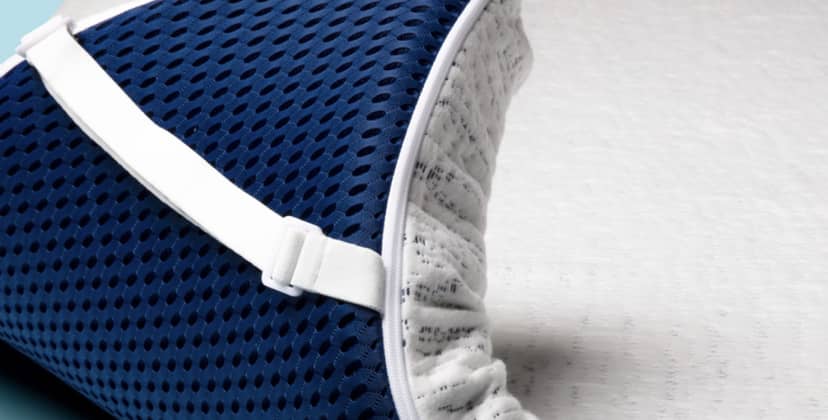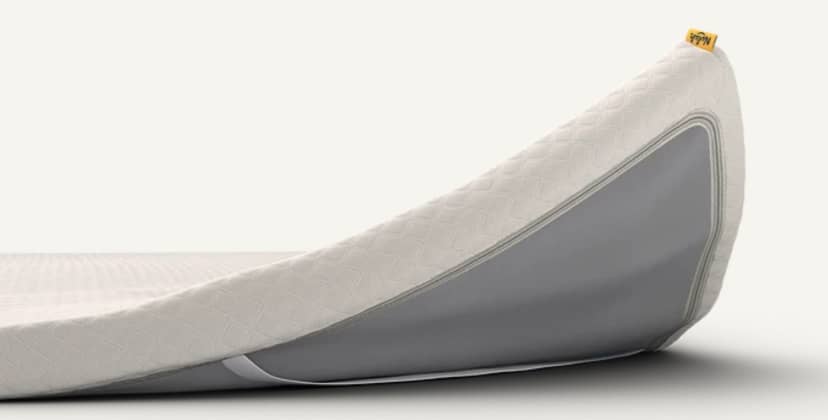When you buy through our links, we may earn a commission. Products or services may be offered by an affiliated entity. Learn more.
Best Mattress Toppers for Hip Pain
Hip pain is a common concern that can affect the quality and comfort of sleep. Discomfort can stem from a wide range of issues, including arthritis, bursitis, tendinitis, injuries, and more. If you’re suffering from hip pain, you should consult a doctor for a diagnosis and treatment options. However, if your hip discomfort is worse when you wake up in the morning, your mattress could be a contributing factor. A pressure-relieving, supportive bed may help improve sleep quality and comfort for a more restful night.
If your mattress is sagging or otherwise damaged, replacing it may be a good option. However, a new mattress can be pricey, and this expense may be difficult to justify if your bed is still in good condition. A mattress topper can adjust your sleep surface at a fraction of the cost. Toppers act as extra comfort layers that sit on top of the bed to change its feel. For many individuals, this modification may help reduce hip discomfort.
How a topper will affect your hip pain may depend on the causes of your discomfort, the firmness of your existing mattress, and your sleep position, among other factors. We’ll break down important aspects to consider when deciding if a mattress topper is right for you. We’ll also highlight some of the best options on the market today.
The Best Mattress Toppers for Hip Pain
-
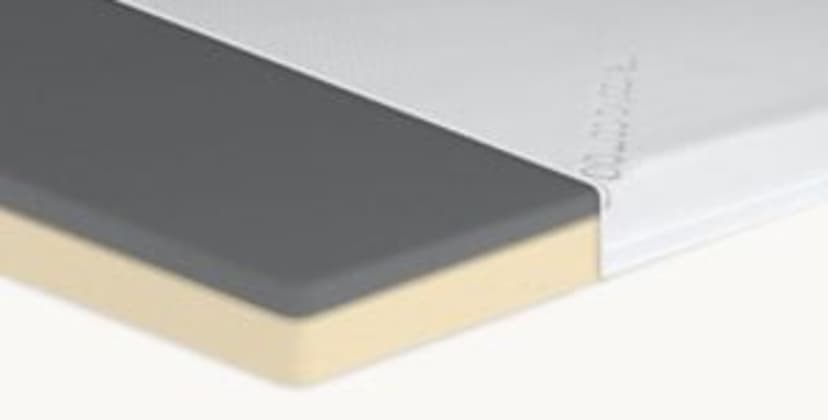
Best Overall
Saatva Graphite Memory Foam Mattress Topper
Shop Now
-
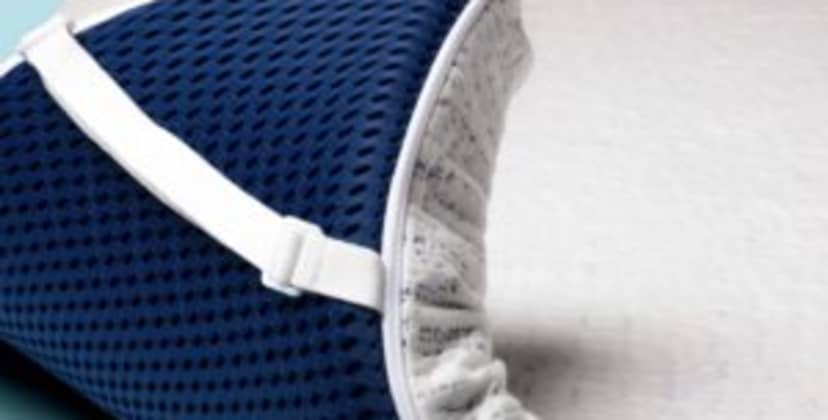
Best Value
ViscoSoft Select High Density Mattress Topper
Shop Now
-
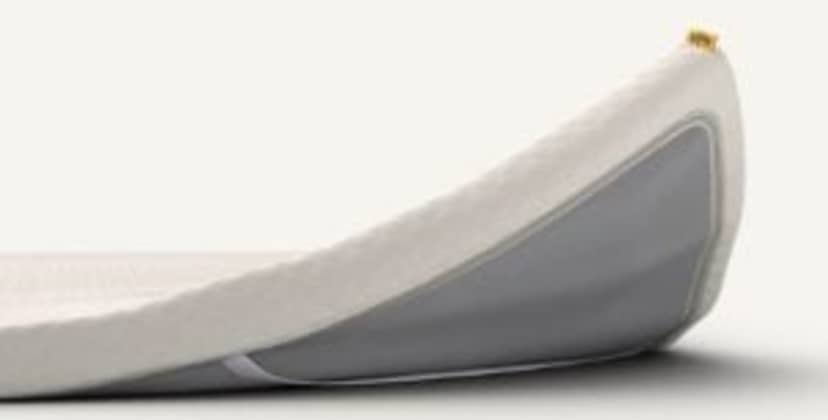
Most Comfortable
Nolah Mattress Topper
Shop Now
-
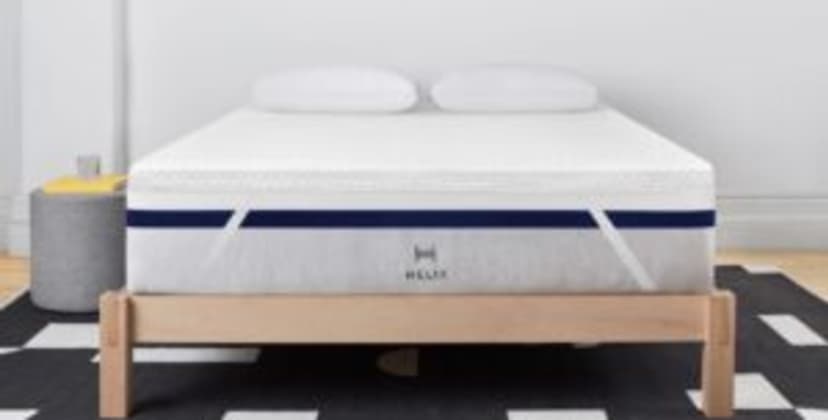
Best Cooling
Helix GlacioTex Premium Mattress Topper – Luxury Plush
Shop Now
-
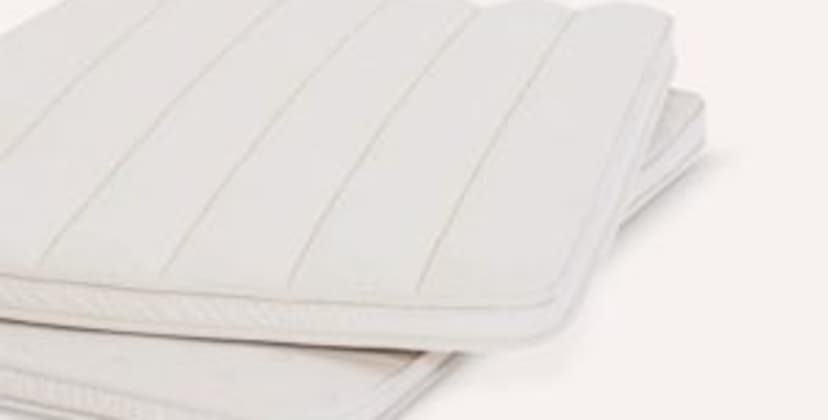
Best Luxury
Birch Plush Organic Mattress Topper
Shop Now
-
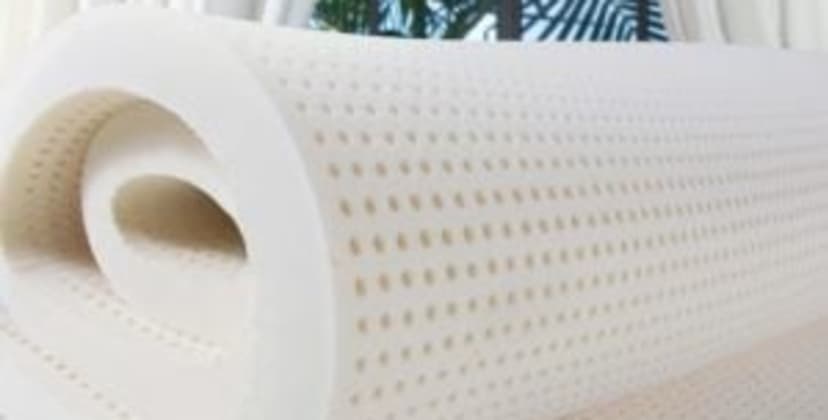
Best for Side Sleepers
PlushBeds Natural Latex Topper
Shop Now
-
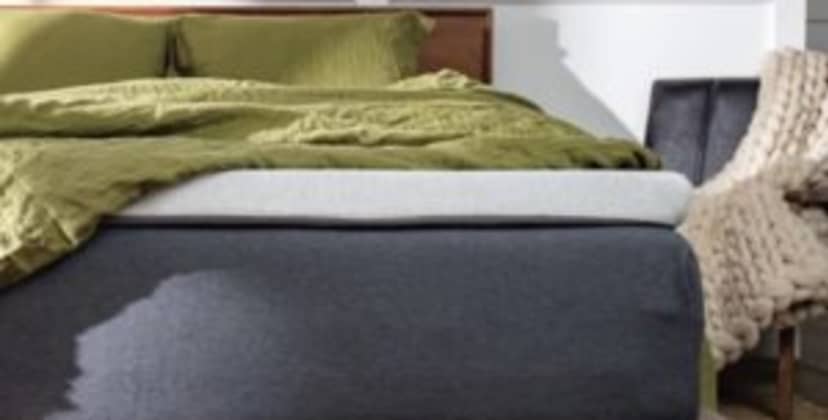
Best Pressure Relief
Muse Mattress Topper
Shop Now
-
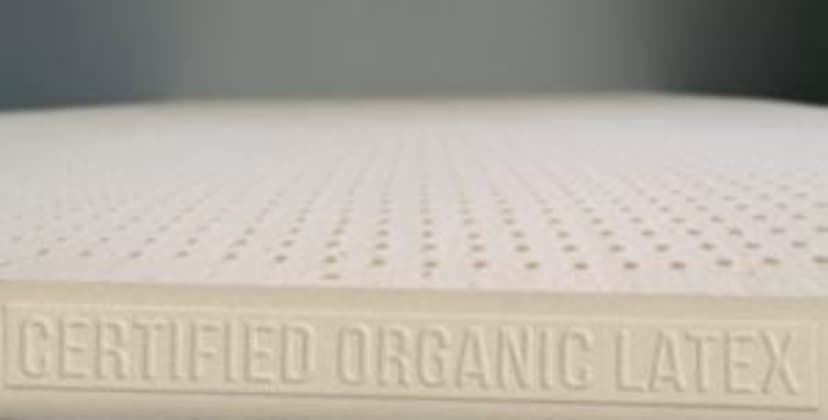
Best Firmness Options
Turmerry Latex Mattress Topper
Shop Now
-
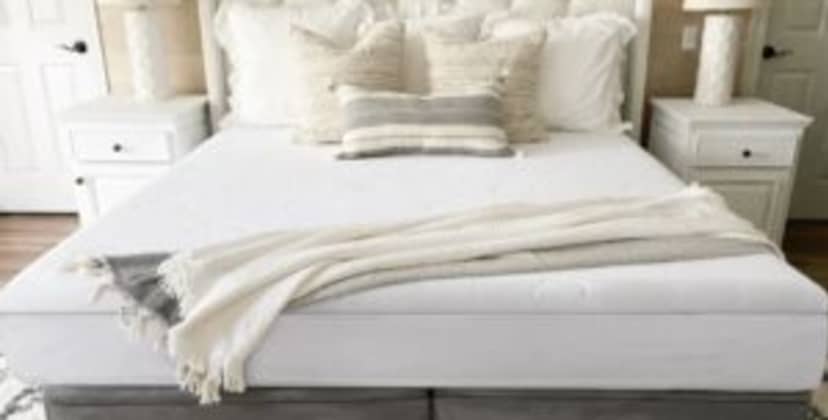
Best Temperature Regulating
Puffy Deluxe Mattress Topper – Soft
Shop Now
-
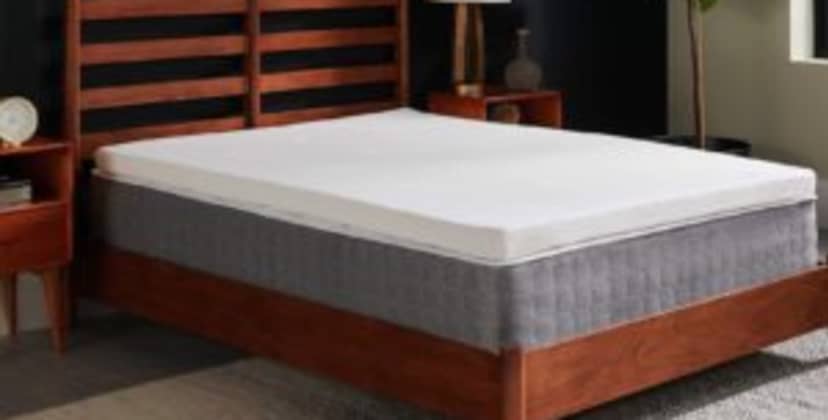
Best for Combination Sleepers
Tempur-Pedic TEMPUR-Adapt Topper
Shop Now
In-Depth Reviews
Best Overall
Saatva Graphite Memory Foam Mattress Topper
Use this link for the most current Saatva discounts
Shop Now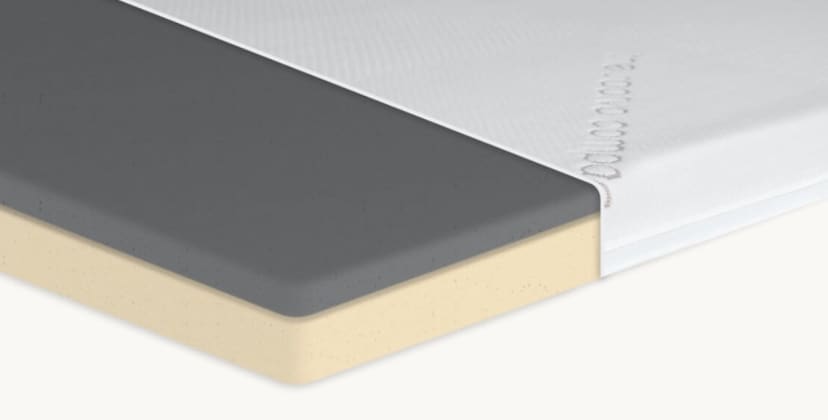
The Saatva Graphite Memory Foam Mattress Topper is designed with a memory foam layer over high-density foam, resulting in excellent pressure relief for people who wake up with pain or discomfort in the hips. The medium soft feel is ideal for a wide swath of sleepers.
-
Pros
-
Graphite-infused memory foam contours closely without trapping too much heat
-
Cotton cover enhances breathability
-
Good balance of contouring and support
-
-
Cons
-
Foam is prone to heat retention
-
Some sleepers may find the foam inhibits movement across the surface
-
Price
$445
Material
1″ Graphite-infused memory foam, 2″ Memory foam
Firmness
Medium Soft (4)
Saatva is a mattress and bedding company known for its high-quality materials and construction, and its Mattress Topper is no exception. The Saatva Mattress Topper is available in three models that vary by material, and our team’s favorite design during testing was the Graphite Mattress Topper. Composed of memory foam over high-density base foam, the topper is designed to provide relief for areas of the body that experience painful pressure buildup.
The topper offers deep contouring and reduces motion transfer. A graphite infusion in the top layer is intended to pull heat away from a sleeper’s body, making this a good option for sleepers who would like a memory foam topper that runs cooler than traditional foam. With a medium soft (4) feel, the topper earned the most favorable ratings from side and back sleepers on our team weighing up to 230 pounds.
The topper’s cover is made from breathable organic cotton, and it can be easily removed and spot-cleaned with a mild detergent. A GOTS certification ensures the cotton has been sustainably sourced. Thick, elastic corner straps secure the topper to your sleep surface and prevent shifting when you change sleep positions or toss and turn.
Saatva offers a 180-night sleep trial and 1-year warranty. The Graphite Mattress Topper ships free within the contiguous U.S.
If you’re looking for a topper to ease pressure off your hips, the ViscoSoft Select High Density Mattress Topper has a thick foam design that cradles your body closely and relieves pressure buildup. The approachable price-point sweetens the deal.
-
Pros
-
Breathable design and gel infusions intended for cooling
-
Dense foam construction is highly durable
-
Two profile options
-
-
Cons
-
Stomach sleepers over 230 pounds may find the topper too soft
-
Noticeable heat retention due to foam design
-
Price
$200
Material
Gel-Infused memory foam
Firmness
Medium Firm (6)
Combining affordability and comfort, the ViscoSoft Select High Density Mattress Topper may be an excellent budget-friendly option for hip pain sufferers looking for a highly comfortable topper. This topper uses high-density memory foam that feels simultaneously plush and supportive.
The foam absorbs motion while remaining whisper-quiet to reduce nighttime disturbances when your partner moves. The gel infusion is intended to transfer heat away from the sleeper, while perforations help circulate air so the heat can dissipate. The topper comes in 3- and 4-inch profiles, and you can choose to add a charcoal or lavender infusion. A bamboo rayon cover further helps with temperature regulation. This material is breathable, moisture-wicking, and quick-drying to stay cool and comfortable. A mesh bottom panel allows additional airflow while preventing slippage. Corner straps also help anchor the topper in place. Owners can remove and machine wash the cover to keep the sleep surface clean.
The Select High Density Mattress Topper has a medium feel that rates around 5 on the 10-point firmness scale. This firmness level should accommodate a wide variety of sleepers, but it best suited our team’s side and back sleepers. The thicker profile significantly reduces pressure buildup in the hips and shoulders, while the dense composition prevents excessive sinkage. Both models are thick enough to help correct the feel of an older or indented mattress.
Shoppers can select between the six standard mattress sizes and queen short. ViscoSoft ships free to customers in the contiguous U.S. The Select High Density Mattress Topper comes with a 90-day return policy, and it is backed by a 5-year warranty against structural defects.
The Nolah Mattress Topper is made of adaptive foam that cradles your pressure points while providing a baseline level of support for areas like your lower back — all of which helps ensure your spine stays nicely aligned. With two firmness options available, you can pick a model that best suits your sleep position and personal preferences.
-
Pros
-
Adaptive AirFoam cushions and contours closely to reduce pressure along the spine
-
Organic cotton cover is soft and breathable
-
Choose from two firmness levels based on your weight and sleep position
-
-
Cons
-
Elastic straps only fit mattresses between 10 and 15 inches thick
-
Customers must pay shipping fees for topper returns
-
Price
$399
Material
2″ AirFoam polyfoam
Firmness
Medium Soft (4), Medium Firm (6)
Proper spinal alignment is key to getting a good night’s sleep and waking up without soreness or stiffness. Your mattress can interfere with alignment if it doesn’t provide enough cushioning, and wear and tear from age can compound this problem. The Nolah Mattress Topper is composed of adaptive foam that cradles the spine and evenly distributes your weight. You can choose from two firmness levels — medium soft (4) or medium firm (6) — for optimal comfort and support.
Our team tested both designs. We found the medium soft feel is best suited to side and back sleepers who weigh less than 130 pounds, as the foam conforms very closely and may sink too much beneath heavier individuals who use these positions. This firmness level is also a good option if your mattress has become overly firm with use. Our side and back sleepers who weigh 130 pounds or more preferred the gentle contouring and even support of the medium firm topper.
An organic cotton cover encases the foam. This material is highly breathable, and the foam has an open-cell composition to resist heat buildup, so the topper should sleep fairly cool — especially compared to models with traditional memory foam. Each corner features a thick elastic strap to secure the topper and prevent shifting when you change positions or toss and turn. The straps can only be used with mattresses between 10 and 15 inches thick, a range that covers most models sold today.
The Nolah Mattress Topper is competitively priced and standard ground shipping is free within the contiguous U.S. Your order comes with a sleep trial that runs for 30 nights. If you’re satisfied with the topper after the trial ends, you’ll also receive a 10-year warranty covering various structural and material defects.
Best Cooling
Helix GlacioTex Premium Mattress Topper – Luxury Plush
Use this link for the most current Helix discounts
Shop Now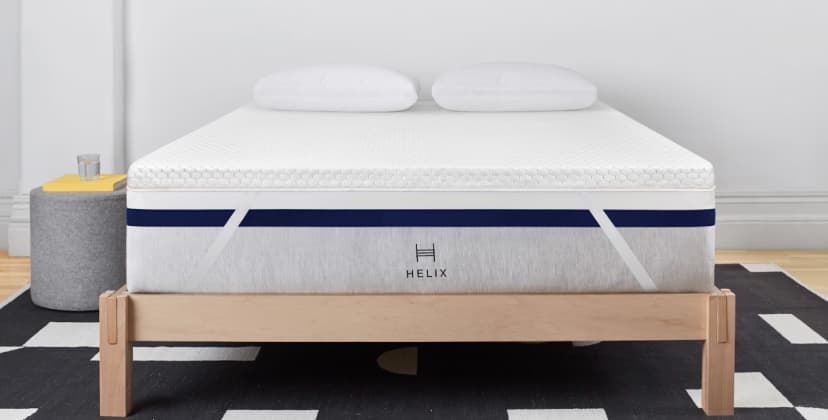
The Helix GlacioTex Premium Mattress Topper – Luxury Plush offers steady air circulation throughout the interior and a phase change cover that dissipates body heat on contact. A thick profile with cushy foam layers also means your sleep surface will feel much plusher and more adaptive.
-
Pros
-
Dense foam and microcoils provide deep cushioning and sturdy support
-
GlacioTex cover captures and releases body heat
-
Thick profile ensures a significant comfort adjustment
-
-
Cons
-
Initial off-gassing odor is fairly strong
-
Cover cannot be removed for cleaning
-
Price
$399
Material
1.5″ polyfoam, .75″ microcoils, 1.5″ high-density polyfoam
Firmness
Medium Soft (4)
Toppers that alleviate hip pain and sleep cool can be hard to come by — the general rule of thumb is that the softer and more adaptive your sleep surface feels, the more heat it will trap. Helix mitigates this issue with the aptly named GlacioTex Premium Mattress Topper – Luxury Plush. A cover engineered for excellent breathability and consistent internal airflow set this topper apart from many competing models that use thick foam layers.
Measuring 3.75 inches thick, the topper significantly changes how your mattress feels without causing too much sinkage thanks to its medium soft (4) feel. The topmost layer is composed of soft polyfoam that molds to your figure, alleviating pain and pressure points in your most sensitive areas. Microcoils and dense base foam provide additional cushioning while keeping your body on an even plane.
Ultimately, the topper’s cover is the star of the show. GlacioTex is a phase change material, meaning the fabric is designed to capture and release body heat while feeling cool to the touch at all times. This effectively offsets heat absorption in the foam layers. GlacioTex also has a soft texture, adding to the topper’s plush surface feel. You can’t remove the cover, so spot cleaning is needed if stains or smudges occur.
Our team thoroughly enjoyed this topper during our hands-on tests. Side sleepers weighing at least 130 pounds and back sleepers up to 230 pounds were particularly impressed. We also awarded high marks for motion isolation and pressure relief, attributing both to the topper’s thick profile and adaptive design. You may notice some strong off-gassing odor for the first few nights — we recommend airing out the topper in a well-ventilated room until the smells dissipate.
Helix offers free ground shipping to all 50 states. Each order comes with a generous sleep trial spanning 100 nights in length. Those who keep their topper after the return period ends also receive a one-year warranty against workmanship defects.
Best Luxury
Birch Plush Organic Mattress Topper
Use this SleepFoundation.org link for the most current discount on Birch mattress toppers
Shop Now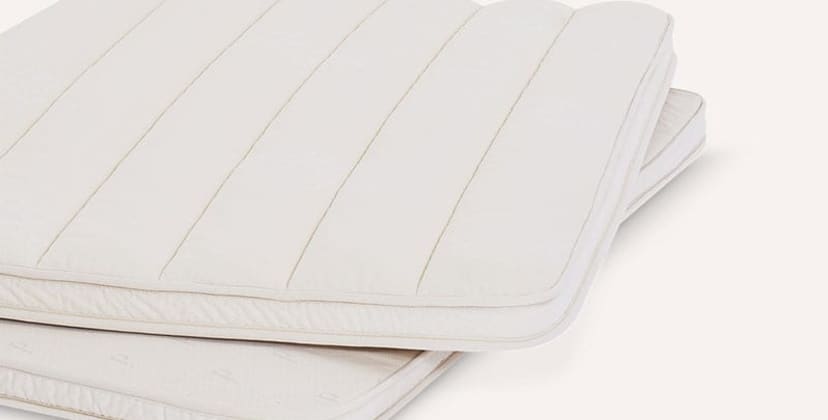
The Birch Organic Mattress Topper uses latex and wool to produce a luxuriously plush feel that alleviates pressure points and stays nice and cool. The premium quality of the materials justifies the higher price tag.
-
Pros
-
3 inches of Talalay latex with medium (5) firmness
-
Excellent balance of contouring and support
-
Wool layer wicks moisture and enhances cushion
-
-
Cons
-
Not suitable for anyone with a latex allergy
-
Price tag is higher than many competing toppers
-
Price
$399
Material
Talalay Latex
Firmness
Medium (5)
If your mattress is causing pain or discomfort in the hips, a quality mattress topper might be a worthwhile investment. The Birch Organic Mattress Topper is a luxury latex topper with a medium (5) feel that helps alleviate sharp pressure points during sleep.
The topper contains 3 inches of Talalay latex, which is typically regarded as a softer type of latex. Since latex contours with the body, it provides strong relief for sleepers who tend to experience pressure buildup during sleep. At the same time the responsive feel creates pushback, so it is ideal for sleepers who seek pressure relief without the feeling of sinking deep into the bed. On top of the latex is a wool layer that enhances the plush feel and also wicks moisture from the body. A breathable organic cotton cover encases the surface. Since latex, wool, and cotton all have naturally breathable properties, this topper is a good option for sleepers who tend to overheat.
Side sleepers who weigh at least 130 pounds should find the topper very comfortable. This sleep position puts pressure on the hips and shoulders, thus requiring some cushion to relieve any pressure buildup. Back sleepers who weigh up to 230 pounds may also benefit from this topper’s design. Back sleepers need a balance of cushion and support to maintain healthy spinal alignment without putting pressure on the spine.
Birch provides a 100-night sleep trial with this topper, as well as a 10-year warranty. The company ships free to all 50 states.
Best for Side Sleepers
PlushBeds Natural Latex Topper
Use this SleepFoundation.org link for the most current discount on PlushBeds mattress toppers
Shop Now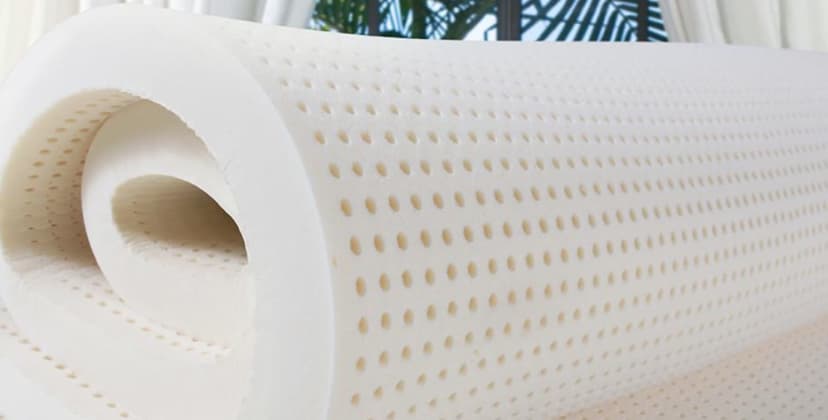
The PlushBeds Natural Latex Topper comes in five firmness levels, which guarantees a suitable topper option for side sleepers across most body types. Gentle cushioning from the latex is great for easing pressure off the shoulders and hips.
-
Pros
-
Natural latex offers exceptional durability and responsiveness
-
Customers choose from five firmness levels and two profile options
-
Ventilated design provides excellent airflow
-
-
Cons
-
Must purchase cover separately
-
Topper is not eligible for returns
-
Price
$429
Material
2-3″ natural Talalay latex
Firmness
Soft (3), Medium Soft (4), Medium (5), Medium Firm (6), Extra Firm (8)
The ideal firmness for any given sleepers is closely tied to body type and sleep position. If you live with hip pain, then you should choose a topper with a firmness level that provides the right balance of cushioning and support. Regardless of how much you weigh or which position you prefer, chances are the PlushBeds Latex Mattress Topper will meet your needs. This topper is available in five firmness levels: soft (3), medium soft (4), medium (5), medium firm (6), and extra firm (8).
Each feel is best suited to certain types of sleepers. People who weigh less than 130 pounds and sleep on mattresses that feel overly firm should consider the soft or medium soft options – especially if they sleep on their sides. A medium feel may be more comfortable for people in the range of 130 to 230 pounds, while those who weigh more may prefer medium firm or extra firm instead. You can also choose a profile of 2 or 3 inches for your topper. Thinner models can improve the feel of mattresses with moderate wear and tear, while the thicker profile adds significant cushioning for mattresses that feel excessively uneven or saggy.
The topper is composed of natural latex, a material prized for its long lifespan and responsive feel. Small perforations that allow air to circulate should prevent the latex from trapping heat and sleeping too warm. The latex should only be spot-cleaned if stains occur. For an extra charge, customers can add a removable, machine-washable cover made of organic cotton. The cotton is quite breathable and should enhance – rather than hinder – the latex’s cooling properties.
Best Pressure Relief
Muse Mattress Topper
Use this link for the most current Muse discounts
Shop Now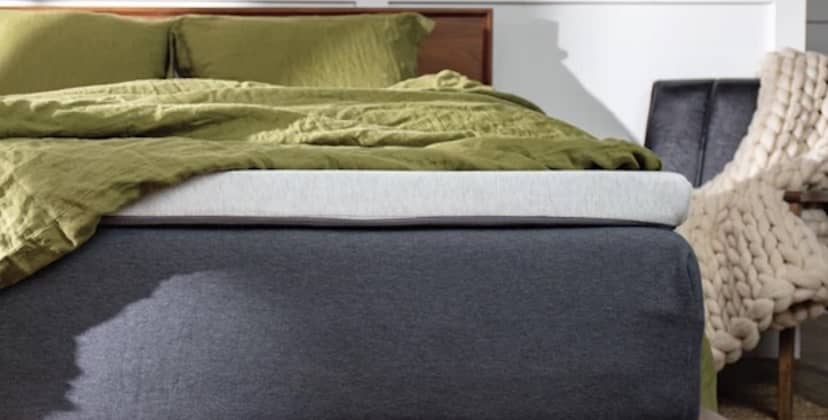
With a thick all-foam design, the Muse Mattress Topper cushions your body in all the right spots without sacrificing too much support in areas like the lower back. The result is a topper that promotes strong sleep posture for many side and back sleepers.
-
Pros
-
Thick foam design offers deep contouring
-
Strong motion isolation
-
Machine-washable cover
-
-
Cons
-
Foam is likely to trap some heat
-
Sleepers over 230 pounds will need a firmer topper
-
Price
$335
Material
3″ memory foam
Firmness
Medium (5)
The Muse Mattress Topper has an all-foam design that offers excellent cushioning for those who prioritize pressure relief with their topper. The mix of contouring and support is ideal for keeping the hips and spine aligned in many sleepers.
The topper is 3 inches high, which is thick enough to substantially adjust the feel of your mattress. Composed entirely of memory foam with a medium (5) firmness, the topper conforms closely and evenly throughout your body. It also reduces motion transfer across the surface, since foam absorbs movement very well. The topper earned the highest ratings from side sleepers who weigh up to 230 pounds, offering just the right amount of contouring to cushion the shoulders and hips without sacrificing too much support. Back sleepers under 130 pounds also found the topper comfortable.
The Muse Mattress Topper is encased in a removable and machine-washable knit cover. The bottom of the cover features anti-slip beads to ensure the topper stays in place at night. You can purchase the topper in six standard sizes, as well as a “queen short” size.
Muse offers free shipping and a 120-night sleep trial. You’ll also receive a five-year warranty with your purchase.
Best Firmness Options
Turmerry Latex Mattress Topper
Use this SleepFoundation.org link for the most current discount on Turmerry mattress toppers
Shop Now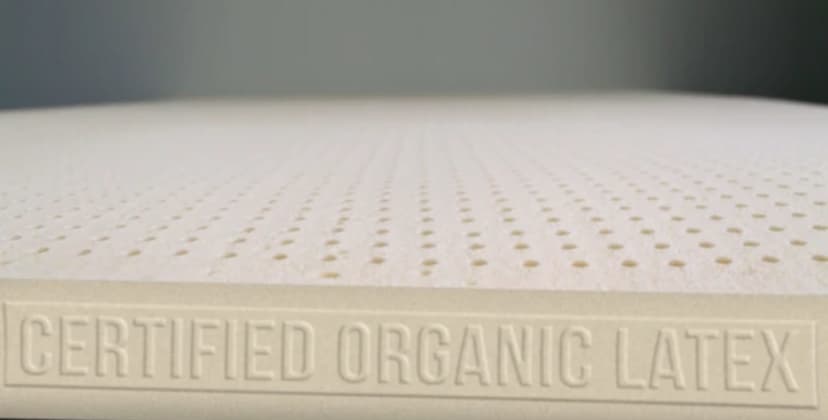
Not only is the Turmerry Latex Mattress Topper available in four different firmness options — you can also choose between three thicknesses for each firmness level. The ability to mix and match firmness and thickness really optimizes the topper’s comfort level.
-
Pros
-
Durable Dunlop latex construction
-
Four firmness options
-
Excellent cooling and temperature control
-
-
Cons
-
Not a good fit for sleepers with a latex allergy
-
Couples may notice some motion transfer
-
Price
$225
Material
2-4″ zoned Dunlop latex
Firmness
Soft (3), Medium (5), Medium Firm (6), Firm (7)
The Turmerry Latex Mattress Topper has two thickness options and three firmness levels to suit a variety of sleepers. Shoppers can choose between a soft (3), medium (5), medium firm (6), or firm (7) feel. Side sleepers should appreciate the close contour from the soft and medium models.
An organic cotton cover encases the Turmerry topper. Made from Dunlop latex, the topper is naturally responsive and durable. It conforms to the body to relieve pressure, but it does not sink as deeply as memory foam. The topper is available in a 2-inch 3-inch, or 4-inch thickness. The 2- and 3-inch toppers are one-sided and available in all four firmness levels, while the 4-inch model is flippable with one soft side and another medium side.
Side sleepers may want to opt for a softer feel to enhance cushioning for the hips and shoulders. Back and stomach sleepers will probably prefer a firmer feel for their topper. We recommend a thicker profile if your mattress has heavy wear and tear.
Hot sleepers should stay cool on the topper thanks to latex’s natural cooling properties, as well as its responsiveness. Latex toppers tend to trap less heat than a “body-hugging” memory foam option. The cotton cover is also naturally breathable and cool to the touch.
Turmerry offers free ground shipping within the contiguous U.S. If you want to try the Latex Mattress Topper, a 60-night sleep trial is available. Each purchases is further backed with a 5-year warranty.
Best Temperature Regulating
Puffy Deluxe Mattress Topper – Soft
Use this SleepFoundation.org link for the most current discount on Puffy mattress toppers
Shop Now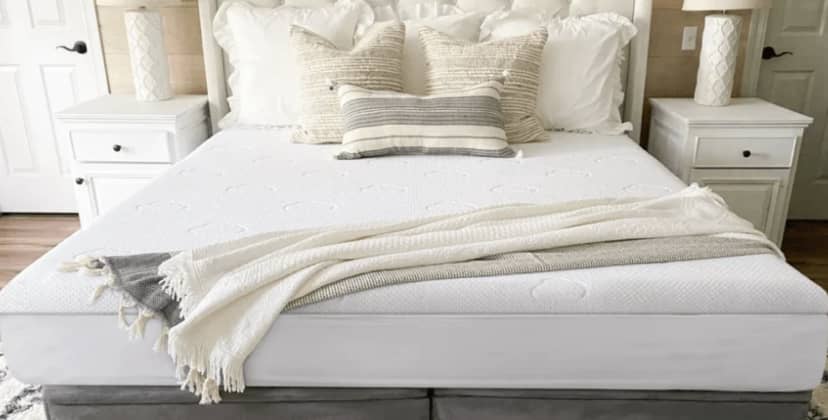
The Puffy Deluxe Mattress Topper is a standout choice for sleepers who need strong pressure relief from their topper. Made entirely of memory foam, the topper has a soft (3) feel that closely cradles sensitive joints to minimize pressure buildup.
-
Pros
-
Soft (3) feel offers excellent contouring
-
Breathable bamboo-derived viscose and polyester cover
-
Lifetime warranty
-
-
Cons
-
Elastic straps are only compatible with beds between 10 and 15 inches thick
-
Too soft for stomach sleepers
-
Price
$229
Material
2.5″ memory foam
Firmness
Soft (3)
The Puffy Deluxe Mattress Topper – Soft is one of two firmness options, rating 3 on our 10-point firmness scale. The soft option has a deeply plush feel that should appeal to anyone who needs strong cushioning or who simply enjoys very plush surfaces. While toppers with deep contouring can sometimes overheat, this model has cooling features that help offset heat retention.
The topper measures 2.5 inches thick and is made entirely of memory foam, and the soft option is quite plush, even for a foam topper. This firmness option is excellent for side sleepers who need generous pressure relief to cushion their shoulders and hips. While some back sleepers may find the soft option comfortable against their spine, the firm option will likely provide better support for their back.
The cover of the Deluxe Mattress Topper is made of 40% rayon derived from bamboo and 60% polyester, a breathable blend of fabric that is meant to help with temperature neutrality. The cover is removable and machine-washable. The elastic band can accommodate mattresses up to 15 inches thick, and the bottom of the topper is designed with small nubs that grip the mattress to prevent slippage.
Puffy provides free shipping to all 50 states. The topper comes with a 101-night sleep trial and a lifetime warranty.
Best for Combination Sleepers
Tempur-Pedic TEMPUR-Adapt Topper
Get 40% off with code TOPPERS40
Shop Now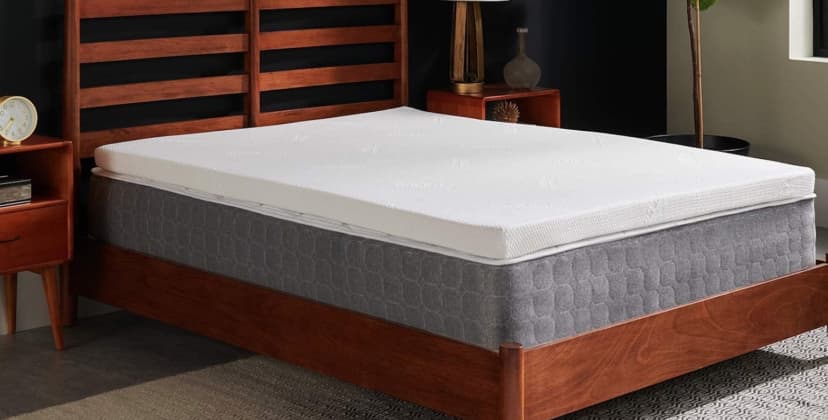
Most foam toppers excel at pressure relief, but the Tempur-Pedic TEMPUR-Adapt Topper pairs strong pressure relief with support that can be attributed to the high-density composition of its proprietary TEMPUR foam. The balanced feel is a great fit for side and back sleepers up to 230 pounds.
-
Pros
-
TEMPUR memory foam’s dense composition ensures even contouring and above-average longevity
-
Thick profile provides a significant comfort adjustment
-
Cover is removable and machine-washable
-
-
Cons
-
Topper cannot be returned
-
Some sleepers may find the topper too hot
-
Price
$419
Material
TEMPUR Memory Foam
Firmness
Medium (5)
The TEMPUR-Adapt Topper exemplifies the high-quality construction and superior pressure relief that has come to define Tempur-Pedic’s memory foam products. The topper’s core contains solid TEMPUR foam, a proprietary material with a dense structure for even contouring and excellent durability. The medium (5) feel is particularly well suited to side and back sleepers who weigh up to 230 pounds, especially those who often feel sharp pressure points along their spine.
With a 3-inch profile, the topper is thick enough to significantly change the feel of any mattress surface. This should provide a temporary fix for anyone whose mattress has become saggy or indented with years of use. The foam also absorbs motion and isolates transfer quite well. If you use a relatively bouncy mattress and tend to wake up when your partner changes positions or gets up during the night, the TEMPUR-Adapt Topper should help cut down on sleep disturbances.
The foam is encased in a breathable knit cover that can be removed and machine-washed whenever a cleaning is needed. Six sizes are available, all of which correspond to standard mattress dimensions. Tempur-Pedic offers free ground shipping to all customers in the contiguous U.S. Returns are not permitted, so all sales are final, but each order is backed by a manufacturer’s warranty that covers structural defects for up to 10 years after the purchase date.
How to Choose a Mattress Topper for Hip Pain
Whenever you modify your sleep surface, it’s important to find the right product to enhance the quality and comfort of your sleep. For those with hip pain, choosing the ideal items may be even more important. Some mattress toppers may ease your pain, while others could exacerbate it. The best mattress topper for hip pain should make your bed more comfortable without a full mattress replacement. Weighing the most important factors may help you find the right option for you.
What to Consider When Purchasing a Mattress Topper for Hip Pain
Many manufacturers may say that their toppers relieve pressure or ease discomfort, but that doesn’t necessarily mean that these options are ideal for your hip pain. Various factors can influence how a topper will feel to you. Focusing on specific criteria rather than marketing claims can help you hone in on the best model for your needs and preferences.
Contouring
Contouring may be particularly important to hip pain sufferers. Since the hips are often where more weight is concentrated, pressure can accumulate here when you lie down. A topper that molds to the sleeper’s shape helps distribute body weight to relieve pressure.
Price
While we don’t recommend making a purchasing decision based solely on price, it is an important factor to consider. Toppers are available at a wide range of price-points, so most customers will likely be able to find an option that fits within their budget. Shoppers should also aim to differentiate between price and value. A low-priced option may not be a good value if it is also low-quality, as it is more likely to have a shorter lifespan. Similarly, a high-priced model could be a good value if its quality, performance, and durability are superior.
Sleeping Position
Sleeping position can affect hip pain and influence which topper may be best for you. We’ll explain the connection between sleep position and hip pain in more detail, but in general, side sleeping and stomach sleeping may exacerbate hip pain. While side sleepers usually prefer a thicker, softer topper to counteract this effect, stomach sleepers may look for a thinner, firmer model.
Quality Materials
Since a topper’s components affect its comfort, durability, and overall performance, quality materials are beneficial. For those with hip pain, this may be particularly true. Lower-quality materials tend to be more prone to developing lasting indentations that jeopardize their contouring and support, so they may no longer provide the same level of pressure relief that hip pain sufferers usually prefer.
While toppers made of quality materials typically cost more, it may be more affordable in the long run to invest in one high-quality topper, rather than buying a lower-quality model you have to replace more often.
Cooling Properties
The best mattress toppers for hip pain often conform closely to the sleeper’s body, which can cause heat to build up. Memory foam is particularly susceptible to heat retention. This may be uncomfortable for those who are already prone to sleeping hot. Many toppers combat this tendency with foam engineered for enhanced breathability, cooling covers, gel infusions, perforations for ventilation, and/or advanced cooling materials.
Latex, polyfoam, fiber, and down/feather toppers generally have better temperature control than most traditional memory foam toppers, but they may also include enhanced cooling features to accommodate hot sleepers.
Firmness Level
Finding the ideal firmness level can help provide a more comfortable night’s sleep for those with hip pain. A topper that is too firm may lead to more pressure buildup around the hips, while one that is too soft could allow the hips to sink in too far, potentially contributing to both hip and lower back discomfort.
The optimal topper firmness will depend on your weight, sleep position, and mattress. Most toppers are usually medium to medium firm because these options have broad appeal. However, sleepers who weigh less than 130 pounds and those who sleep on their sides may prefer a slightly softer surface. Those who weigh more than 230 pounds or who sleep on their backs could favor a firmer option.
Thickness
The thickness of the topper influences the extent to which you’ll notice the feel of the bed underneath. Thinner toppers start around 1 inch high. These options alter the feel a bit, though the sleeper will most likely continue to notice the contouring and support of the mattress beneath it. Thicker toppers can measure up to 4 inches deep, which may significantly alter the feel of the existing mattress.
People who have hip pain that’s aggravated by a mattress that’s significantly too soft or too firm may prefer a thicker topper, while those looking for a little extra cushioning may benefit from a thinner option.
Pressure Relief
Pressure relief is typically closely linked to contouring. When a topper lets the hips sink in a bit, it helps reduce some of the pressure that would ordinarily accumulate. Since pressure can exacerbate hip pain, many sleepers prefer to select a topper with strong pressure-relieving properties.
How Does Sleeping Position Affect Hip Pain?
Sleep position is often directly linked to hip pain. Some positions increase pressure on the hips, which can contribute to discomfort. Taking your sleep position into account when selecting a mattress topper can help you find the right mixture of support and pressure relief.
Side Sleepers
For side sleepers, the hips often sink deeply into the bed. This can cause pressure points to develop.
Finding the ideal topper thickness and firmness may be the ticket to sleeping comfortably. If your mattress is close to your optimal firmness but doesn’t have quite enough contouring, a thinner model may suffice. If your mattress is much too firm, a thicker topper may give your hips more room to sink in before reaching the bed.
A medium topper should be suitable for many side sleepers with hip pain, but individuals who weigh under 130 pounds may need a softer option in order to experience cradling. Those who weigh more than 230 pounds may need a firmer option so that they don’t sink in too deeply.
Back Sleepers
Back sleeping is usually the position most conducive to healthy spinal alignment, and it may help relieve hip pain for some individuals. Ideally, a topper should cradle the hips and support the lower back. A medium topper may strike this balance for many sleepers, though individuals who weigh less than 130 pounds often prefer a softer option and those who weigh more than 230 pounds may favor a firmer model. The optimal thickness will depend on how significantly the sleeper wants to alter their sleep surface.
Stomach Sleepers
Extra weight around a sleeper’s abdomen and hips can pull their midsection too deeply into the bed when they sleep on their stomachs. Most often, this results in lower back pain, but it could also contribute to discomfort in other areas, like the hips and neck.
To prevent excessive sinkage, stomach sleepers usually need a firmer topper. If their mattress is too soft, a firm, thick model may enhance its support. However, stomach sleepers looking for a softer sleep surface might select a thin topper so that they won’t sink in too much before they reach the support of the mattress.
Combination Sleepers
For many with hip pain, combination sleeping is a comfortable solution. It carries the potential benefits and drawbacks of the other positions, but when discomfort occurs, the sleeper can simply change positions. Combination sleepers may prefer to select a topper that’s best suited for their most frequent position. If they favor multiple positions equally, a mid-range firmness and thickness should accommodate them. These sleepers should also consider how well the mattress topper facilitates movement, as materials like latex help make it easier to change positions throughout the night.
Which Type of Mattress Topper Should I Choose?
The type of mattress topper you should choose will depend on your personal preferences, existing mattress, and what is likely to feel best for your hip pain. With so many potential causes of hip pain, there’s no one-size-fits-all solution. We’ll explain the most common options to help you weigh the potential pros and cons.
Polyfoam
Polyfoam toppers use a synthetic foam that contours to the body to reduce pressure buildup around the hips. This material has an open-cell structure that allows air to circulate so that it doesn’t stay trapped against the body. Polyfoam toppers are often among the most affordable, which may give hip pain sufferers a chance to decide whether a topper will help ease their discomfort without a huge financial commitment.
Memory foam
Like polyfoam, memory foam is a synthetic material that adjusts to the sleeper’s shape. However, memory foam is typically denser and more expensive. While it tends to be slower to respond to changes in pressure and more likely to retain heat, its close-conforming hug combines contouring and support to relieve hip pressure while promoting proper spinal alignment. Some memory foam toppers also include gel infusions designed to help pull heat away from the body, and/or other special features for enhanced temperature control.
Latex
Most latex mattress toppers use natural latex, which is formulated from the sap of rubber trees. Synthetic and blended options are also available, though less common. While a latex topper should conform to the body to relieve pressure from the hips, it spreads the compression over a wider surface than memory foam. This may promote a floating sensation rather than a hug, which can make it easier to change positions if your hip becomes uncomfortable.
Latex is more breathable and buoyant than most traditional memory foam, so it may satisfy hot sleepers and couples looking for a more responsive surface for sex.
Feather and Down
Down and feather toppers add cushioning more than contouring. They can provide a soft surface for sore hips, but they won’t redistribute the sleeper’s weight to the same extent as polyfoam, memory foam, and latex. If the existing mattress provides good contouring and support, a feather or down topper may make the bed even more comfortable for those with hip pain. Down alternative options are also available, which mimic the feel of down.
Wool
Like feather and down toppers, a wool model can cushion the surface of the bed, but it is unlikely to add notable contouring or support. However, wool has strong temperature regulation, transferring heat away when the sleeper gets too warm and insulating when the sleeper gets chilly. Wool also wicks away moisture to help keep the sleeper drier and more comfortable if they sweat during the night. Because of this, a wool topper may be a good option for hip pain sufferers with a mattress that sleeps too warm, or those who simply want extra cushioning.
Frequently Asked Questions About Mattress Toppers and Hip Pain
Either a soft or firm option may be appropriate for hip pain depending on your weight, sleep position, and existing mattress. Lighter individuals do not sink into a topper as deeply as those who weigh more, so people who weigh less than 130 pounds may need a softer model for enough pressure relief to ease aching hips. Individuals who weigh more than 230 pounds may prefer a firmer topper to prevent them from sinking in too deeply.
Without the right balance of contouring and support, a mattress could aggravate hip pain. On a mattress that is too firm, pressure accumulation around the hips could cause more discomfort. A mattress that is too soft may not provide enough support, causing your muscles to tense in an attempt to maintain proper spinal alignment. Many conditions can cause hip discomfort, but if your pain is worse when you wake up and fades throughout the day, your bed may play a role.
Knowing when to replace your mattress is often critical to reducing sleep discomfort. Sagging and lasting impressions may diminish the bed’s support, thereby triggering hip pain. While a topper can be used to adjust your existing bed, it cannot repair a broken or sagging mattress. In these cases, it may be wise to consider upgrading your mattress to one that will help relieve hip pain.
While an ill-fitting mattress could be the root cause of your hip pain, a wide range of medical conditions can also contribute to nighttime discomfort. Various types of arthritis, including osteoarthritis (OA), rheumatoid arthritis (RA), psoriatic arthritis, septic arthritis, and juvenile idiopathic arthritis, can all cause hip pain. Osteoarthritis is perhaps the most common, and it has been shown to negatively affect sleep quality.
Other medical conditions, including fibromyalgia and sciatica, can also contribute to hip pain. While some of these are less common, talking to your doctor about your symptoms can help you get a diagnosis and a clearer action plan.
Changing your sleep position or using additional accessories may help provide hip pain relief.
Depending on what’s causing the pain, a sleeper might simply roll over to reduce hip discomfort during the night. Rotating positions regularly helps limit the drawbacks from any one position. Many hip pain sufferers find the most relief lying on their backs. However, those who have pain in just one hip might also lay on their sides with the affected hip facing upward to prevent pressure buildup.
The right sleep accessories could also help reduce hip pain. The best pillows will support your head and neck to keep the spine aligned and help your muscles relax for reduced discomfort. Pillows can also be beneficial for other parts of the body. Side sleepers might place a pillow between their knees to help keep the hips aligned. A body pillow can provide extra support while preventing twisting that could put the hips out of alignment. Back sleepers might use a pillow under their knees to take pressure off their lower backs.
Some hip pain sufferers may also benefit from an adjustable bed, which allows you to shift positions quickly and easily to accommodate changing needs and preferences. Raising the head and legs slightly and sleeping on the back typically relieves pressure on the lumbar region and hips, allowing the muscles to relax fully. Many adjustable bases even have a “zero gravity” setting specifically designed for optimal pressure relief.
Still have questions?
Our product experts have extensive experience testing just about every sleep product on the market.
Send an email to [email protected] with your questions and we’ll help you find exactly what you’re looking for.

